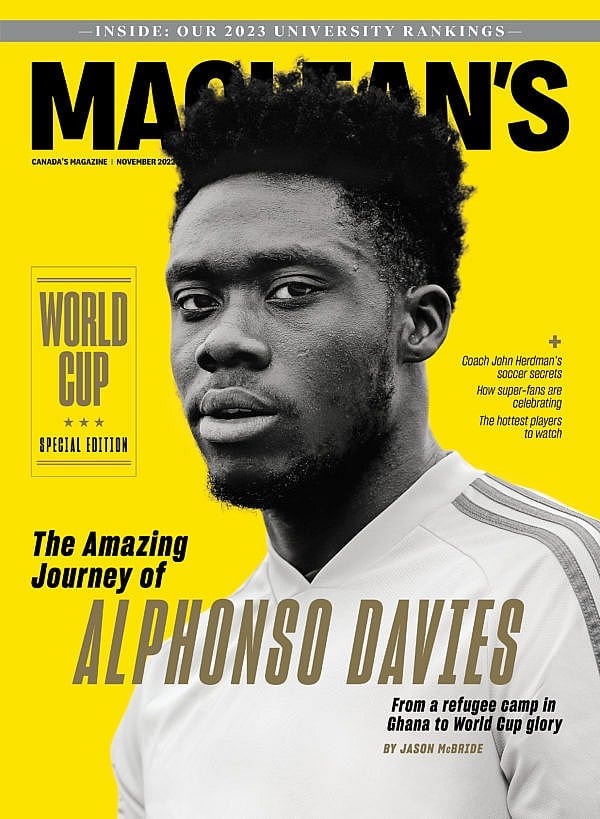World Cup 2022: Canada’s cheering section
Five soccer superfans chat about their love of the beautiful game and what it’s like to root for both Canada and their long-time favourite national teams.
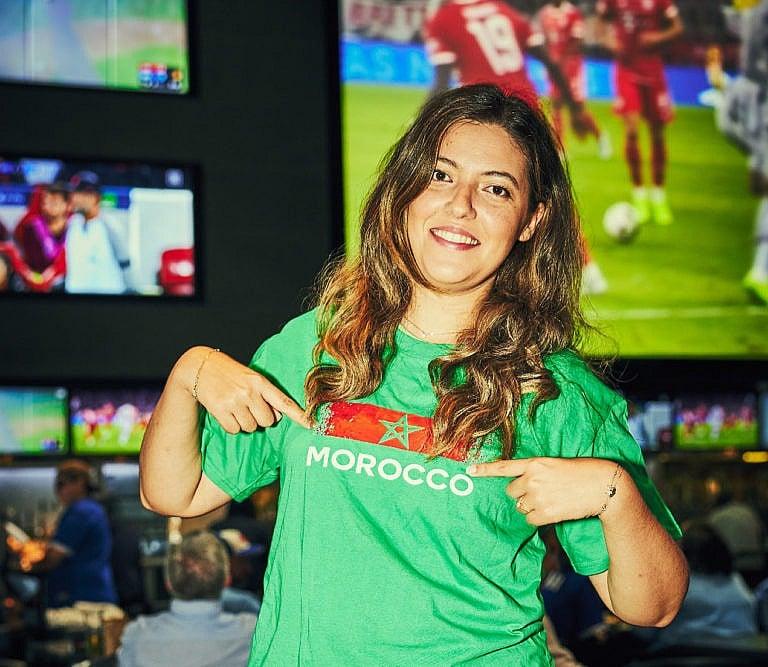
Shot at Real Sports at York and Bremner in Toronto. (Photography by Daniel Ehrenworth)
Share
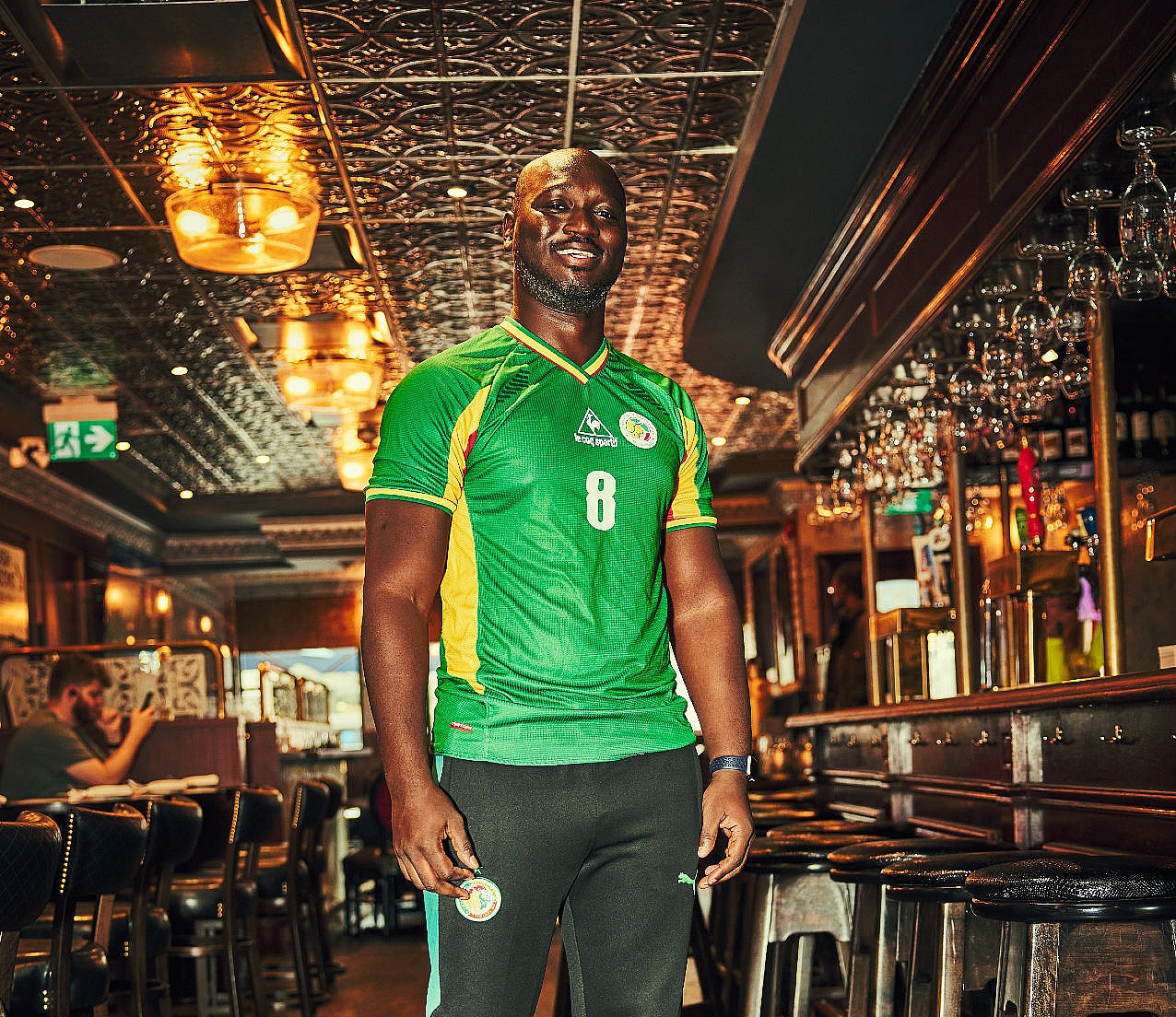
Shot at The Duke of Kent at Yonge and Eglinton in Toronto. (Photography by Daniel Ehrenworth)
Amadou Mbaye, 40
Translator
Team: Senegal
I was born in Diourbel, Senegal, a small town two hours east of Dakar. Senegal is a soccer-obsessed country, so the sport has always been a big part of my life. My father, Abdoulaye, was an executive with the Senegalese Football Federation, which ran the regional league in our area. I’d play soccer in the streets with my brothers and friends every single day. In the summer, we’d play until the street lights turned on at sunset. That was our cue to head home.
I vividly remember my first World Cup: Italy 1990. My favourite players were creative and audacious with the ball, like Romania’s Marius Lăcătuș and England’s David Platt. I was ecstatic when Senegal qualified for its first World Cup in 2002. It’s a relatively small country, but we did exceptionally well. We made it to the quarterfinals and beat France, the defending champions.
Shortly after that, I moved to Montreal, which has a sizable Senegalese community. I played a lot of pick-up soccer at the local fields while I attended the University of Montreal. In 2011, I moved to Toronto and started working as a French translator. I organized pick-up games and created my own team, the Lions de la Téranga, which is the nickname of the Senegal national soccer team. Now, I play at least four times a week all over Toronto, no matter the season.
As for the real Lions team, I’m excited to see how they do in this World Cup. They’re the current African champions, and the team is filled with elite players like Sadio Mané, Kalidou Koulibaly and Édouard Mendy, who is arguably the best goalkeeper in the world. I think they might emulate the success of the 2002 team. Senegal will always be number one, but I’ll also be supporting Canada. This country has given me so much. Back in Senegal, people don’t know much about the state of the Canadian game, but I’ve been following their young and talented team. It was only a matter of time before they sealed a World Cup spot.
Over the years, I’ve seen the game’s popularity rise, especially among Canadian girls. To play hockey, you need skates, a stick and, of course, the ice. For basketball, you need a hoop. But you can play soccer in bare feet, and you don’t even necessarily need a ball—you can just use bunched-up rags or a bottle. Soccer just brings people together; it’s how I met many of my closest friends here. I’m going to host many of them—some Senegalese—to watch the Cup on TV. Hopefully, we’ll recreate some of the excitement from back home.
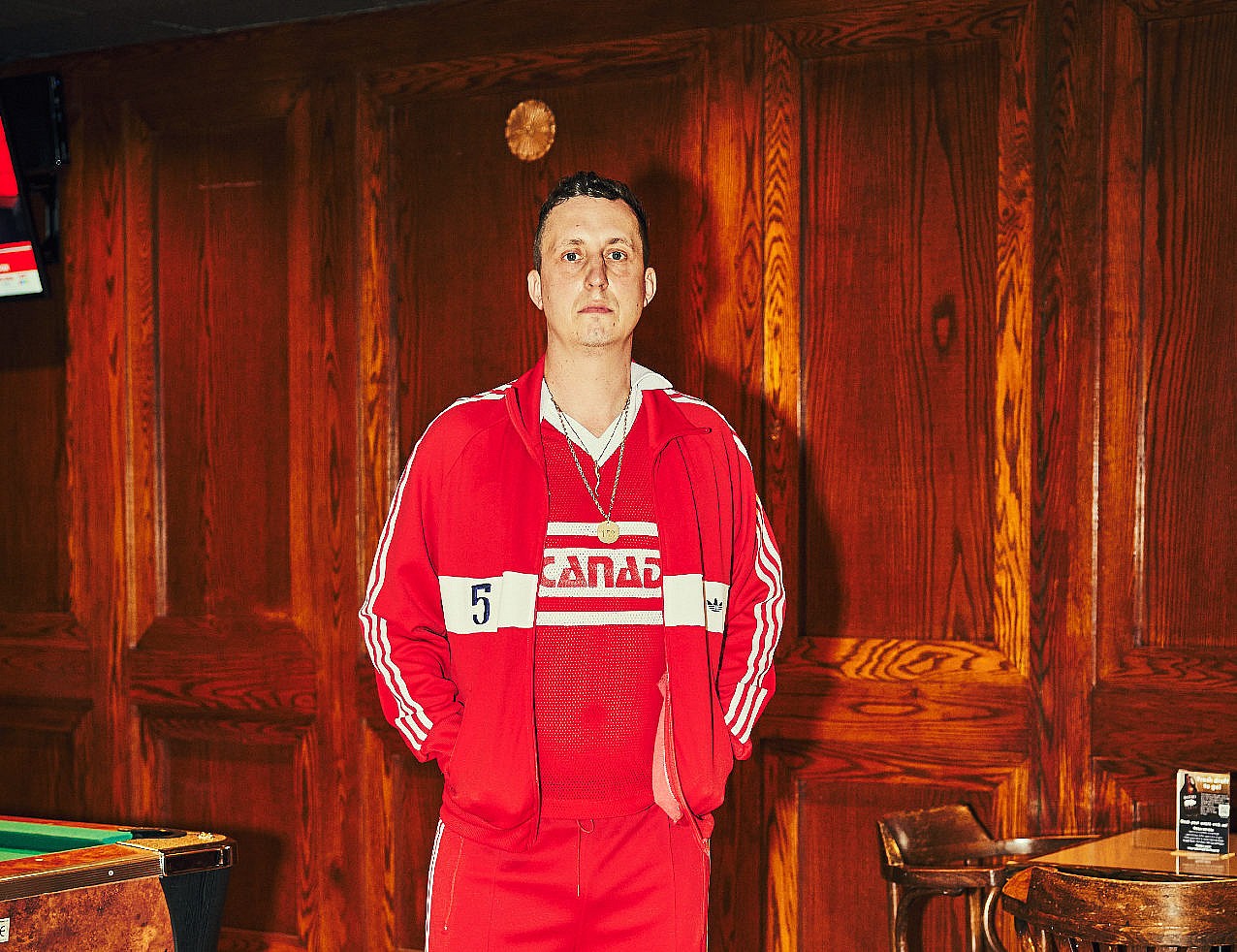
Shot at The Rhino at Queen and Dufferin in Toronto. (Photography by Daniel Ehrenworth)
Christian Parlee, 42
Child and youth worker
Team: Germany
My Opa got me a soccer ball for my first birthday. It was an Adidas model that would have been made in either France or West Germany. The first World Cup I remember watching was in 1990: there was a keg of beer (for older family members) and sausages were being dried in the back. Everyone was chain-smoking. It could not have been more stereotypically German. Germany beat Argentina, and it still sends shivers down my spine. Soccer is a live-and-breathe type of situation for me—anybody who knows me will tell you that.
The kids I played soccer with were either Italian, Irish, Portuguese or Dutch, and they all supported their teams back home. It didn’t dawn on me that Canada even had a team until I was in my teens, so when Toronto got one, I was excited. I’ve been a TFC season ticket holder since 2007. Now that Canada has Major League Soccer clubs to develop domestic talent we aren’t losing all our young players to Europe. That said, I still support SV Werder Bremen. I was born and raised in Stratford, Ontario, but I grew up in a household of German immigrants, speaking fluent German and celebrating German holidays, so that’s the club I cheer for.
I’ve been collecting jerseys dating back to the ’70s for more than 20 years—game-worn and otherwise. Seven years ago, I bought one I didn’t recognize, so I started doing research. There was a short-lived Canadian league called the CSL, the Canadian Soccer League, that existed from 1987 to 1992 and came about after we first qualified for the World Cup. Was it like a Premier League or La Liga? No, but it was ours.
In the process of figuring out which numbers each teammate wore, I was put in touch with some ex-CSL players. It’s a very Canadian story; they’re all super modest. James Lowery—who played in the World Cup, is driving a bus in Victoria. Nick Gilbert won the Golden Boot in 1987, when the Calgary Kickers won the league—he’s now a postman. I realized I needed to start documenting my findings, so I launched a website called CSL Memories. A lot of contributors are ex-players themselves.
Any Canadian that’s been watching our team play for five or more years will tell you how difficult it’s been—so much heartbreak. I am cautiously optimistic this time. We have no experience in such a large tournament, but that could also make us fearless. Honestly, any game that’s not a huge loss will feel like a win. I work in a hospital now, so I can’t take time off in December, but I’ll trade shifts—whatever I have to do. I’ll either alternate between wearing my 1986 Canada national team home and away jerseys, or I’ll sport my 1980–81 under-20 Canada national team away jersey, which is as old as me. Germany will be fine without me, Canada needs me now.
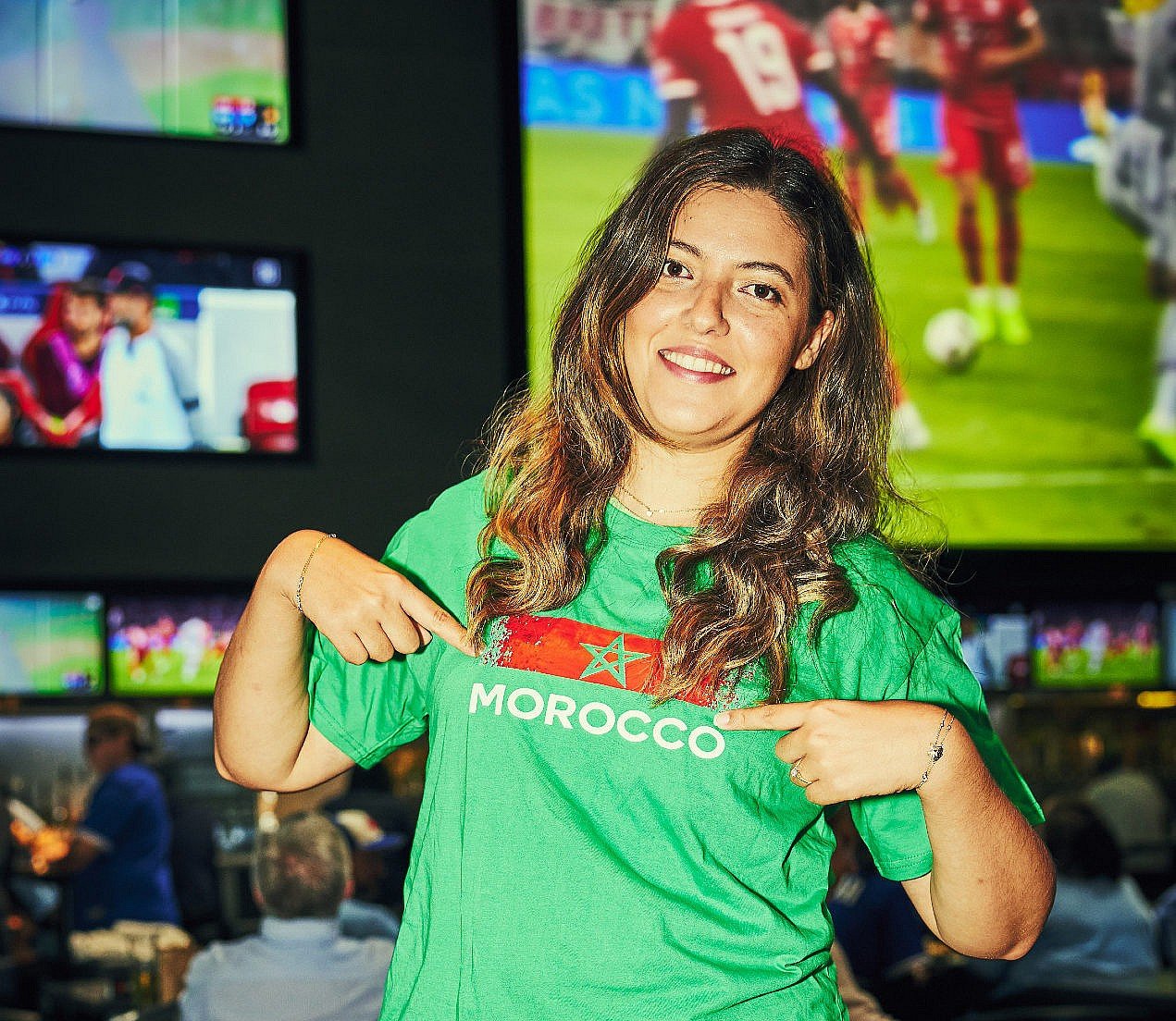
Shot at Real Sports at York and Bremner in Toronto. (Photography by Daniel Ehrenworth)
Nada Benhachim, 30
Teacher
Team: Morocco
I met my husband, Mehdi, when we were both in our early 20s and living in Casablanca, our hometown. Soccer has always been Mehdi’s passion: he started kicking a ball when he was three years old, played as a striker for youth clubs and dreamt of going pro. His idol was Salaheddine Bassir, the Moroccan star striker who scored two of the goals in Morocco’s famous 3-0 win over Scotland at the 1998 World Cup. As for me, I was constantly surrounded by soccer growing up, but never interested in it. In Morocco, soccer is traditionally something that’s meant for men. Mehdi got me curious about why it was such a big deal, and he taught me the intricacies of the sport: the tactics, the formations, the one-on-one battles between different players.
We moved to Toronto in 2013 and got married two years later. In 2016, Mehdi and I went to a bar to watch the European Championship final between France and Portugal. I fell in love with the atmosphere: everyone was cheering together and there was a wonderful energy in the air. I realized that soccer creates a reason to be joyful. I love bringing our kids—Melina, who’s two, and Yiannis, who’s one—to watch their dad play competitive pick-up games on Sunday mornings.
Mehdi and I are both feeling positive about Morocco’s prospects in this World Cup. The national team just hired a new coach. That’s usually not a good sign so soon before a Cup, but he’s a former player, so hopefully he’ll inject some vitality into the team. It’s also exciting to see how the perception of soccer is changing in Morocco. Our national women’s team just qualified for their first World Cup, which will be held in 2023. It was incredible to see the women in my family cheer for them and watch their games. That wouldn’t have happened 20 years ago.
We’re a bit torn on who to support in Morocco’s final group game. They’ll be facing Canada, our home for the past nine years. I won’t be sad if Canada wins. It is the birthplace of our children, after all. We’re already making plans to watch the game with a big group of our Moroccan friends in Toronto. We’ll all be wearing our red-and-green Moroccan jerseys, and some of us are bringing flags as well. Whoever wins, we will definitely celebrate in the streets.
Even in Canada, more and more people are discovering that soccer is the beautiful game. Our kids are too young to really watch the World Cup this year, but I’m sure they’ll both be playing and watching in 2026, when Canada co-hosts. I especially hope that Melina has a different relationship to soccer than I did when I was a kid. She’s got a few jerseys already.
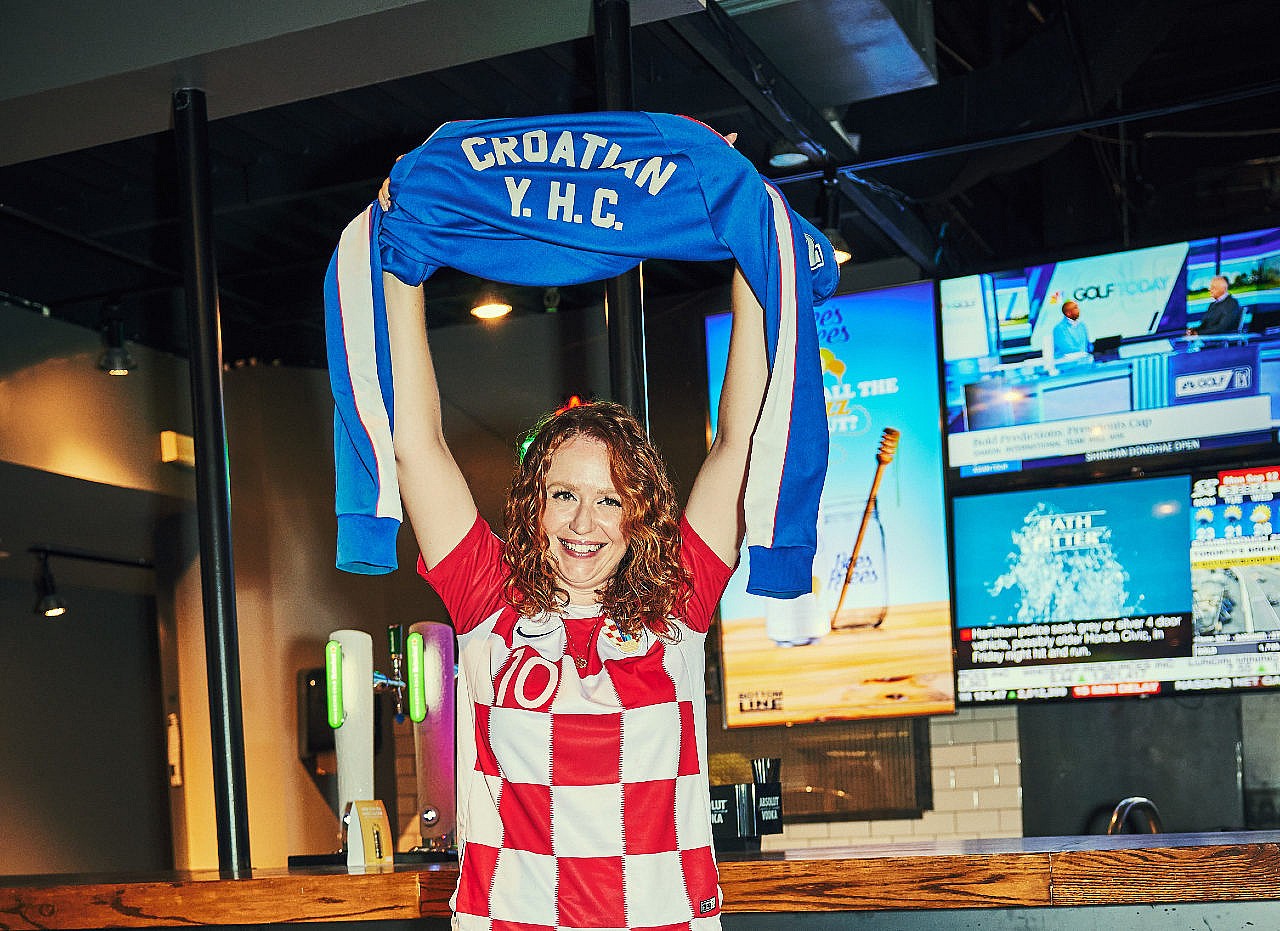
Shot at The Bottom Line at Yonge and Front in Toronto. (Photography by Daniel Ehrenworth)
Kristina Boros, 38
IT consultant
Team: Croatia
I’m a bad employee at precisely two times: during the World Cup and during the Euro Cup. In 2014, when I was living in Ottawa, I left in the middle of a shift at American Apparel to watch a semifinal match between Brazil and Germany. I was fired shortly after that.
My dad’s from Croatia, so the sport is political for us. Our national team was readmitted to FIFA in 1992, during the Croatian War of Independence. When I was eight or nine, my dad would take my sister and I to anti-war rallies at Hamilton City Hall. The other time the Croatian community would come together was for games. We’d watch them at a Croatian restaurant in Stoney Creek called Checkers, and it would be packed with people. I have distinct memories of being surrounded by older men screaming, “CORNER!” I don’t think anyone even noticed my sister and I were there. The Croatian War ended in 1995, and the following year, we qualified for the 1998 World Cup. We celebrated independence with every game—especially the wins.
When I lived in Vancouver during the 2018 World Cup, I would go to the Croatian Cultural Centre to watch games with my relatives. Hundreds of people were there, rejoicing and passing drinks around. Traditional music played over the speakers at first, but people brought instruments for the finals—small guitars, accordions, even a stand-up bass. There’s a Croatian club in Hamilton, too, but this time around—because of the pandemic—my family and I have been watching qualifiers at home. I took my TV off the wall and set it up in my backyard so we could watch the action outside. For the Canada-Jamaica match, I went to my parents’ house with my sister. My dad was so excited. We were all jumping around and screaming. I couldn’t believe it when Canada won. I’d never seen it in my lifetime—being two doesn’t count.
Croatia and Canada are competing in the same group, which is kind of disappointing. Having two groups to follow would make the tournament much more exciting. Still, I’m cheering for Canada. It’s not hard, being Canadian. Plus, there’s a very good chance they’ll lose. I don’t know if I’ll get to see them in the World Cup again, so I have to root for them while I can. If Canada was going to present a real challenge, I think I’d feel torn.
The World Cup airs during the NHL and NBA seasons. I wonder if cities will have viewing parties, like Toronto does in Jurassic Park for the Raptors. I’d really love to experience soccer the way we do hockey: by going to a bar with a group of people, with everyone rooting for Canada. That’s a huge part of the sport for me—cheering alongside other fans. Thankfully, my boss is doing their best to accommodate game days.
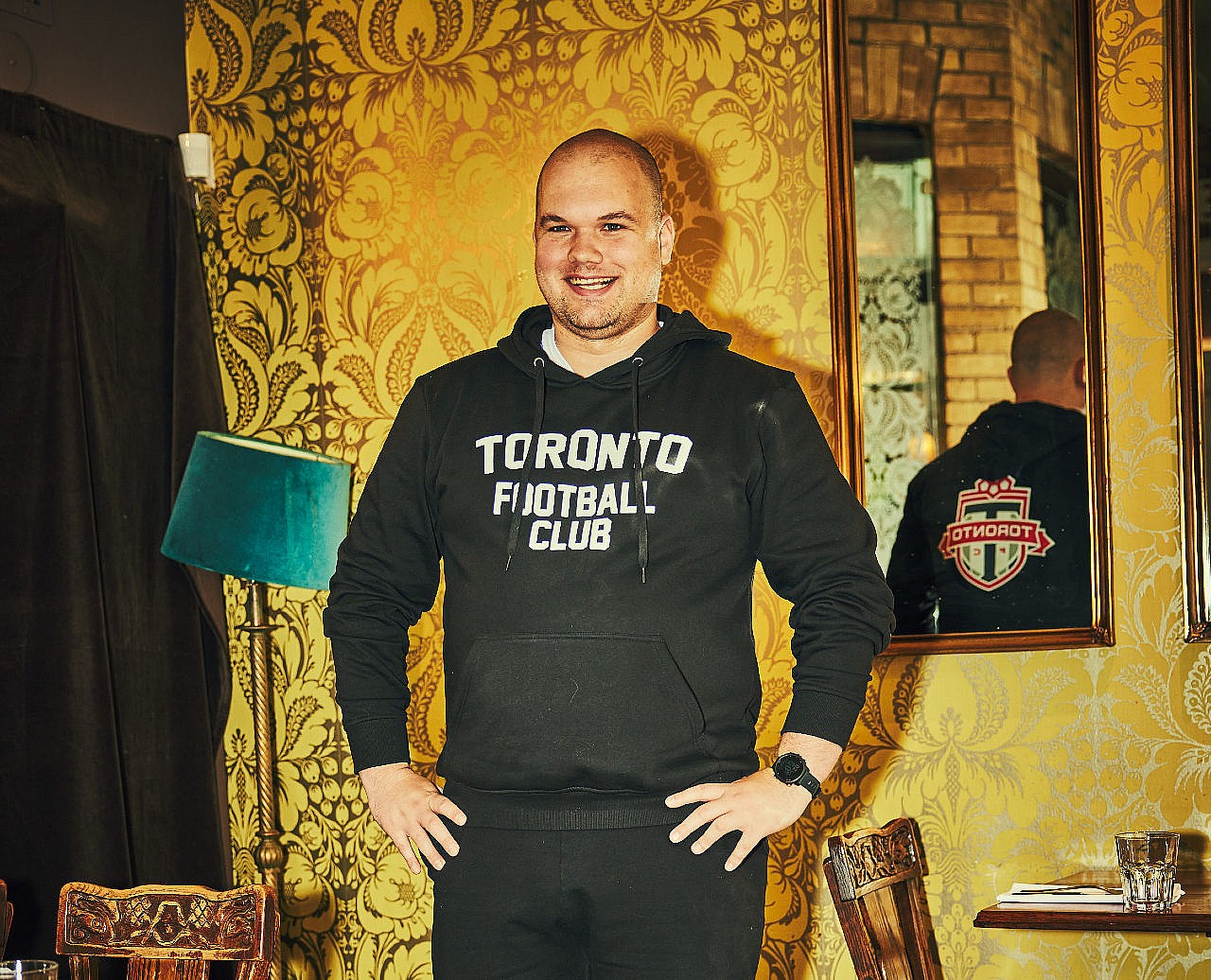
Shot at The Queen & Beaver at Bay and Elm in Toronto. (Photography by Daniel Ehrenworth)
Emil Cohen, 29
Android developer
Team: England
I watched my first World Cup in 1998, when I was six. It’s tradition to root for your parents’ teams in European households, so I quickly became a fan of Team England. (My dad grew up near Leeds.) Besides, at that point, Canada hadn’t qualified for a World Cup in more than a decade. After the Cup, I started playing a lot of soccer, mostly as a centre-midfielder. By the age of 10, I was travelling 45 minutes to play in Vaughan. I wanted to go pro, but soccer wasn’t as popular in Canada back then—not like it is now. There was no Canadian Premier League and no MLS teams.
I don’t play competitively anymore, but I’m still a huge fan. I’m a Toronto FC season ticket holder, and I’ve travelled to all seven of Team Canada’s home qualifying matches for this World Cup. One highlight was flying to Edmonton with my girlfriend last November to see them play Mexico and Costa Rica in frigid weather. We stayed at the Westin Edmonton—the same hotel as all the players. The Canadians had all played in that weather before, but the other team wanted no part of it. They stepped onto the freezing-cold pitch at the very last minute, and never stood still.
My current favourite player is Jonathan Osorio—he’s played for Toronto FC since 2012—but, obviously, Alphonso Davies is sensational. It’s incredible to see a Canadian play like he does. We’ll definitely be an underdog at the World Cup, but our secret weapon is cohesion.
It’s funny to come into this tournament not rooting for England first. I’ve been a fan of Leeds United, just like my dad, since I was young. They were so bad in the previous decade that they were demoted from England’s Premier League to its third tier, League One. Even still, in 2012, I got a tattoo of their logo on my left bicep. Fandom is about loyalty.
People have asked whether I’ll struggle to cheer for Canada this time, but the answer is no. I was born and raised here, and always wished I had the kind of chance to root for my country that I do now. I hope the game is projected up on the big screen in downtown Toronto. I’d go down there and watch with my girlfriend, my brother and, of course, my dad. He might have a tough time splitting allegiances if Canada and England meet in the semis, but I still think he’ll side with Canada. Traditions change sometimes.
This article appears in print in the November 2022 issue of Maclean’s magazine. Buy the issue for $8.99 or better yet, subscribe to the monthly print magazine for just $29.99.
